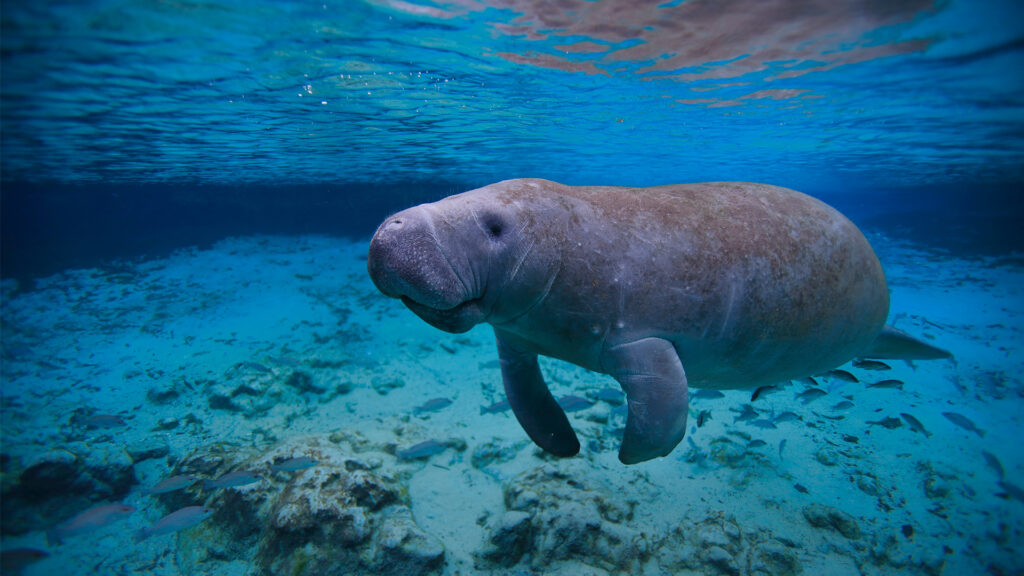By Renata Happle, Earth Law Center
Florida courts may expand forms of representation to encompass non-human constituents. In a move of rare bipartisanship, Florida state Sen. Jennifer Bradley (R-Fleming Island), Rep. Lindsay Cross (D-St. Petersburg) and Rep. Berny Jacques (R-Clearwater) filed Senate Bill 272 and House Bill 297 this past legislative session to appoint courtroom animal advocates, or volunteer lawyers or legal interns to advocate on behalf of an abused cat or dog’s welfare in custody decisions.
Similar to how the court offers a guardian ad litem to ensure the best interest of children, volunteers would assist in gathering information from veterinarians, animal control officers and law enforcement officials; participate in hearings; draft a victim impact statement and provide recommendations to the court. These bills, while uncontroversial and almost apolitical, offer exciting precedent for non-human Florida residents who are far more vulnerable than pets, including the ailing West Indian manatee and Florida panther.
Legal representation for non-humans is an emergent field of practice. While rights of nature – or legal personhood for nonhuman entities like georegions or species – is preempted in Florida, this bill could offer potential for the expansion of legal subjectivity for nonhuman animals to be represented in court.

Florida’s manatees are in desperate need of advanced legal protection. Despite being protected under several laws including the Marine Mammal Protection Act of 1972, the Endangered Species Act of 1973 and the Florida Manatee Sanctuary Act of 1978 – which make harassment and hunting of manatees illegal and punishable as a criminal offense – their yearly death rate reached all-time highs in 2021 and 2022 due to starvation and malnutrition on the Atlantic coast, in addition to harmful algal blooms, boat strikes and cold stress.
In those two years, upwards of 2,000 manatees died, which represents over 20% of the estimated manatees in Florida. In response to mass die-offs, Rep. Vern Buchanan (R-Sarasota) and Rep. Darren Soto (D-Kissimmee) proposed the Manatee Protection Act of 2021, or H.R.4946, to Congress to reinstate the West Indian manatee as an Endangered Species Act, as in 2017 it was downgraded to merely threatened. Without being passed, this bill died in the 117th Congress.
However, other groups are suing to upgrade the manatee’s status. The Center for Biological Diversity, Harvard Law School Animal Law and Policy Clinic, Save the Manatee Club, Miami Waterkeeper and Frank S. Gonzalez Garcia filed a petition to reclassify the West Indian manatee as endangered in November of 2022, and threatened to pursue litigation in May of 2023. On Oct. 11, the U.S. Fish and Wildlife Service conceded that reclassifying the West Indian manatee may be warranted.
In drawing precedent for advancing political advocacy for Florida’s manatees, several campaigns on the Pacific Coast by local communities, cities and counties are encouraging. Advocacy for the Southern Resident Orca in Washington state, Oregon and California emerges as a model to engage in enumerating the rights of marine species. Despite receiving federal protections as endangered under the Endangered Species Act, southern resident orcas continue to decline with only 80 individuals remaining.
Earth Law Center and Legal Rights for the Salish Sea call on local governments and state legislatures to recognize the inherent rights of the southern resident orca which include, but are not limited to, the right to: life; autonomy; culture; free and safe passage; adequate food supply from naturally occurring sources; and freedom from pollution and conditions causing physical, emotional and mental harm.
Further, by securing these rights for the orcas, advocates additionally provide legal protection for their environment and native ecosystems, allowing them to also possess inherent rights, including to exist, flourish, evolve, regenerate, recover and be restored. Passed in seven cities and three counties, the rights-based campaign for southern resident orcas offers an example of bottom-up advocacy in pursuit of statewide protection.

Similarly, San Francisco passed the Free and Safe Passage of Whales and Dolphins in San Francisco’s Coastal Waters Resolution in 2014, which supports “the free and safe passage of whales and dolphins in San Francisco’s coastal waters, San Francisco Bay, and its estuaries” and recognizes the importance that “these magnificent creatures be protected in their natural environment,” drawing their value from their innate intelligence, sentience and emotional capacity. The city of Malibu even passed a proclamation declaring that whales and dolphins “deserve the right to their own freedom and lives.”
These three examples offer precedent for cities, counties and states to legislate rights for marine species in creative ways, even escalating protections guaranteed by the Endangered Species Act.
Inspired by the proposed expansion of legal representation for pets and the potential successful reclassification of the West Indian manatee, I argue that an escalation of legal advocacy for manatees (and other endangered animals) is precedented and possible in Florida cities and counties, perhaps even at the state level. Momentum for manatee protection shouldn’t be wasted, as in a time of widespread habitat degradation and biodiversity loss, defending manatees is entangled in the preservation of seagrass beds, mangrove forests, water quality and kindred species, such as the loggerhead sea turtle and bottlenose dolphin.
Florida’s beloved manatees deserve the right to life and to be able to flourish alongside us. With the passage of rights-based legislation, they can.
Renata Happle is a policy analyst at Earth Law Center, a research assistant with the Yale Center for Environmental Law and Policy, a graduate of Barnard College and an incoming master’s student at the University of Cambridge. She has received fellowships from Columbia University and Yale Law School to study the role of law within the Anthropocene.
If you are interested in submitting an opinion piece to The Invading Sea, email Editor Nathan Crabbe at nc*****@*au.edu. Sign up for The Invading Sea newsletter by visiting here.



